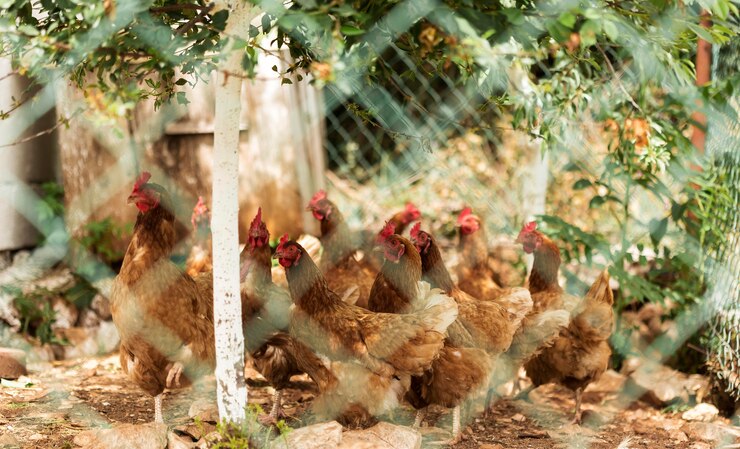There’s no need to beat around the bush. We all know it’s either you succeed in business or you don’t. As the inquisitive person you are, the information you’re exposed to can significantly impact your success.
As a Nigerian SME owner, entrepreneur, or agropreneur, agriculture remains a relevant and lucrative source of income. Poultry farming, in particular, stands out as one of the most viable opportunities.
The truth is, poultry farming has its ups and downs. It can be very profitable but also frustrating, especially when there’s a disease outbreak or unpredictable fluctuations in feed prices, among other challenges.
If you’re new to the business, it’s essential to do thorough research. This includes speaking with those who have substantial experience in the field and reading well-researched articles on the subject.
MSME Africa is here to help you in your research stage. Having gathered sufficient research and responses from several expert poultry farmers within our reach, we will explore Poultry Farming: 15 Mistakes To Avoid as a Newbie.
About Poultry Farming in its entirety
Poultry farming encompasses raising domesticated birds for meat, eggs, or feathers. There are several ways to categorize poultry farms, depending on the scale of operation, housing methods, and the intended purpose of the birds.
By scale of operation, this is a breakdown of the most common types of poultry farming:
- Commercial Poultry Farming: Large-scale operations that raise thousands or even millions of birds for meat or egg production. They often utilize intensive farming methods to maximize efficiency and production.
- Small-Scale Poultry Farming: Smaller farms with a few dozen to a few hundred birds. These farms may cater to niche markets, focus on organic or free-range production, or provide eggs and meat for personal consumption.
- Backyard Poultry Farming: Raising a small flock of chickens, ducks, or turkeys in a backyard setting, primarily for personal consumption or hobby purposes.
By housing methods, we have:
- Intensive Poultry Farming: Birds are housed in confinement with limited space to move around. This can include battery cages, where chickens are kept in individual cages stacked on top of each other, or deep litter systems with large sheds filled with bedding material.
- Free-Range Poultry Farming: Birds have access to an outdoor area where they can roam freely and exhibit natural behaviors. However, the size and quality of the outdoor area can vary significantly.
- Semi-Intensive Poultry Farming: A hybrid approach that combines elements of both intensive and free-range methods. Birds may have some access to an outdoor area but also spend time in confinement.
And going by purpose, the most common types of poultry farming especially in Nigeria include:
- Broiler Farm: Where farmers focus on raising chickens specifically for meat production. These chickens are bred for rapid growth and typically reach slaughter weight within a few months.
- Layer Farms: Where farmers specialize in raising egg-laying hens. These farms may focus on maximizing egg production or prioritize organic or free-range methods.
- Breeder Farms: Where farmers raise breeding stock to produce chicks or poults (baby turkeys) for other poultry farms.
- Dual-Purpose Farms: Where farmers raise poultry breeds suitable for both meat and egg production. This is more common in small-scale or backyard settings.
How to Choose the Right Type of Poultry Farming
The type of poultry farming you choose depends on various factors, including your capital, resources, available land, target market, and personal values. Consider factors like your startup costs, time commitment, your choice of environment, and human resources. Consider your priorities, intensive methods prioritize efficiency, while free-range methods offer better animal welfare.
Poultry Farming in Nigeria: 15 Mistakes To Avoid as a Newbie

1. Decide on Your Type of Poultry Farming
This is the foremost factor determining your success in poultry farming. Intensive farming can be expensive due to infrastructure requirements, while backyard farming has lower initial costs. Larger farms require more daily management and labor compared to small-scale or backyard operations. Consider factors such as the availability of constant electricity and quick access to medicine and feed before you make a choice of your type of poultry farming.
2. Don’t Halt your 9-5 job
Most of the experienced poultry farmers we talked to, advised not to halt your other sources of income, (e.g. 9-5) as a newbie into poultry farming. Except you have the confidence that quitting will not put you in a critical state. Some of our respondents advised the risk is worth it as long as you have the resilience, the choice is yours to make.
3. Look for a Potential Market and have a Go-to-Market Strategy
Have a defined target market but don’t reserve your produce for final consumers alone. As a newbie trying to create awareness and penetrate the market, have different potential customers you can sell to. It’s that simple.
4. Have Enough Capital (and more if possible for times of emergencies)
According to some of the experienced poultry farmers we interviewed, one crucial mistake every poultry farmer needs to avoid is not being financially prepared. This is because when some farmers start their farm they are very excited and anxious to the extent of calculating their profit before it gets to the selling stage.
But they do not calculate how much they are going to spend from day one of the chicks to the maturity stage, and at the end of the day, the cost of feeding and cost of medication will weigh them down or even knock them out of business. Our respondents advise that you calculate the cost of breeding your birds from day old to maturity stage.
5. Start Small and Scale along the way
In poultry farming, especially for beginners, it’s essential to start small and scale gradually as you gain experience and confidence. If you don’t have enough capital, beginning with a manageable number of birds and resources helps you avoid major financial risk. Starting small allows you to learn the intricacies of the business, understand the market dynamics, and work out any operational challenges without overextending your resources.
6. Ensure your Farm Setup is Complete before Stocking
Ensure you have the materials for your poultry structures, cages, farmhouse, etc. In addition, buy quality roofing materials, sawdust, lighting, feeders, etc. Place premium on the health of your chickens. Put structures against pests such as rats, scorpions, and snakes.
7. Get Your Birds from Trusted Retailers
The seventh mistake you ought to avoid as a poultry farmer is buying your poultry birds from an unknown source, or getting birds from a breeder who has poor management. If this happens, you might be buying birds that have diseases that are not immediately palpable, which means the disease might not manifest itself immediately, but as soon as you bring these birds to the poultry house, you’ll discover the birds have been infected.
9. Choose a Good Feed
The ninth mistake you need to avoid when starting as a poultry farmer is not feeding your poultry birds with quality feed or not feeding with the right feed. Feeding is the number one major cost in the poultry business so do not settle for low-quality feed all because you want to save money, you might end up losing your birds, they might fall sick or die and you end up running at a great loss or spending more money.
10. Get Good Vaccine and Drug Outlet
It is inevitable that some birds might develop some form of sickness or even die in the course of growth. Every’s farmer prayer is the impact should be minimal. One way to keep the impact minimal is to have a good supply of the right medicines and vaccines for the birds.
11. Put Measures against Theft
Oh boy, we all know how some humans can be. Sometimes you can be lucky to hire honest employees, other times, you might not be so lucky. Especially if you are into large-scale farming, ensure you have a tight security and record-keeping system for your employees. It’s not only rats that steal eggs, humans do too.
12. You Need to Have a Production Timetable
In poultry farming, having a production timetable is crucial. A production timetable outlines the different stages of poultry growth, feed requirements, vaccination schedules, and production targets. It helps you monitor progress and forecast future needs, such as when to restock feed or expect eggs for harvesting. Without a timetable, you risk inefficiencies and delays that can hurt your overall productivity and profit margins. Planning helps maintain the smooth running of the farm, minimizing loss and maximizing output.
13. Employ an Experienced Farm Manager in Case of Your Absence
Managing a poultry farm, especially on a large scale, requires hands-on attention and expertise. Employing an experienced farm manager is a smart move if you’re often away or if you’re a beginner. A good farm manager ensures that operations continue smoothly, even in your absence. They can oversee the daily management of the birds, monitor feed quality, handle any emergencies, and ensure biosecurity measures are in place. An experienced manager can also reduce the risk of costly mistakes that could arise from inexperience.
14. Don’t Expect Profit for the Next 6 Months
Poultry farming is not a get-rich-quick scheme. Newbies often enter the industry with unrealistic expectations, thinking that profits will come immediately. In reality, it typically takes at least six months to see any significant returns on investment, especially on a large scale. During the early months, much of your capital will go toward setup costs, purchasing birds, buying feed, and maintaining the farm. By setting realistic profit expectations, you prepare yourself to make wise decisions during this period, such as reinvesting profits back into the farm to sustain operations.
15. Avoid Selling on Credit, Even If Profits Seem Guaranteed
Even if your farm is generating good profits and you have a reliable customer base, avoid selling on credit. While it may seem tempting, selling on credit can quickly lead to cash flow problems, especially when clients delay payments or fail to pay entirely. This can severely disrupt your operations, as you will still have to cover feed costs, medication, and other expenses. It’s essential to adopt a “cash-and-carry” policy to avoid getting trapped in debt and financial strain. This ensures steady cash flow, enabling you to reinvest and scale up operations sustainably.
Some good things don’t come easy. Poultry farming requires sufficient time and effort. But with the tips we have listed, based on research from experienced poultry farmers in Nigeria, we are confident you can succeed in poultry farming.
Learning is continuous. Connect with other poultry farmers through our community. Gain the opportunity to learn business tips and growth strategies through our knowledge-sharing programs for Entrepreneurs.










